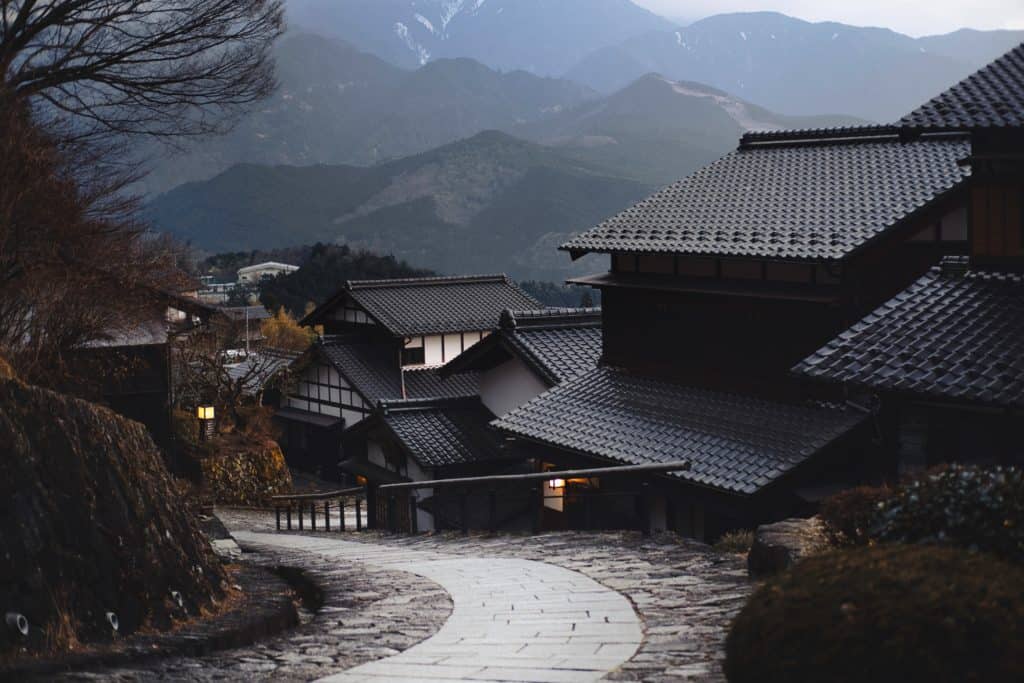Minimum vocabulary needed while in Japan

If you are one of those intrepid souls that prefers to explore the world off the beaten track in Japan, you will likely encounter people who do not speak English. Learning these Japanese phrases could be tremendously helpful.
1. Kore wo kudasai (ko-leh oh kuh-dah-sah-ee)
“This one, please.”
At a restaurant: Point to the item you want on the menu or in the plastic food display, and say, “Kore wo kudasai.”
In a store: Point to the object you want to buy and say, “Kore wo kudasai.”
2. Onegaishimasu (oh-neh-guy-she-mäs)
Onegaishimasu is a very polite “please.”
As you can imagine, this word is endlessly useful.
In a restaurant and you want more water? Lift your glass and say, “Onegaishimasu.”
Many restaurants offer free refills of rice, if that’s what you want, lift your rice bowl and say, “Onegaishimasu.”
Finished your meal and ready for your check? Say “Onegaishimasu.”
If you want to be more specific in asking for your check, say, “Okaikei (ō-käē-këē), onegaishimasu.” “Check, please.”
3. … ii desu ka? (ee des kah)
Meaning, “Is it okay if I…?”
Want to sit down? Gesture to the chair and ask “ii desu ka?”
Basically, anything you want to do, if you can gesture and say “ii desu ka?” you will be understood.
This will also get you major points for politeness.
4. Dōzo (do-oh-zoh)
Dōzo means “Go ahead.”
In a crowded place and want to let someone go ahead of you? Say “dōzo” as you gesture with your arm.
When you ask if you can do something — “ii desu ka?” — you will likely be responded to with “Dōzo.”
5. Kekkō desu. (kehk-koh des)
“No, thank you.”
This is important, as rural Japanese can be very generous with food and drink. If you have reached your limit, say “Kekkō desu.”
Holding your hand over the top of your glass while saying “kekkō desu” also gives a clear signal you have had enough.
6. Hai / iie or dame (hah-ee / ee-yeh / dah-meh)
Hai means “Yes.”
Ie means “No.”
Dame is a stronger “no,” and if accompanied by crossed arms, it’s a very strong “no.”
7. Sumimasen (sue-mee-mah-sen)
“Excuse me.”
Used when you accidentally bump into someone, and as a preface before asking a question. Perhaps this is most commonly used when squeezing between people on a train or other crowded place.
Accompanied by a bow, “sumimasen” can be used for “I’m sorry.”
8. Toire wa doko desu ka? (toe-ee-leh wah doh-koh des kah)
“Where is the bathroom?”
This is a totally common question in Japan, so you need not hesitate to ask.
9. Wakarimasen. (wah-kah-lee-mah-sen)
“I don’t understand.”
Nihongo (nē-hön-gō) wakarimasen. “I don’t understand Japanese.”
10. Eigo dekimasuka? (eh-ee-goh deh-key-mäs-kah)
“Can you speak English?”
I’m sure you can imagine many scenarios where this question would come in handy.
Note about paying
When paying with your credit card, don’t be surprised when the cashier holds up a finger and asks you, “Ikkai barai, desu ka?” In Japan, we are given the option to pay once or to split any payments into revolving charges. Just say, “Hai” to let the cashier know that one payment is fine.
Depending on how far off the beaten track you get, you may encounter shops that do not take credit cards. It’s always wise to carry 10-20,000 yen (USD $120-240).
It’s generally not a problem to pay for a small purchase with a 10,000 yen bill. It’s pretty normal.
Greetings
You may be wondering how to say “Hello” in Japanese. For the answer to that question, please see How To Say Hello in Japanese.
Special thanks to Hiroko who helped me put this list together. She taught Japanese to foreigners for over 55 years, and her insight and suggestions were fabulous. She commented, “We would really appreciate you learning these phrases before you visit.”
If you have questions about Japan or suggestions for articles, please add them in the comments. For more photos and information on Japan, follow me on instagram at: https://www.instagram.com/more_than_tokyo/




